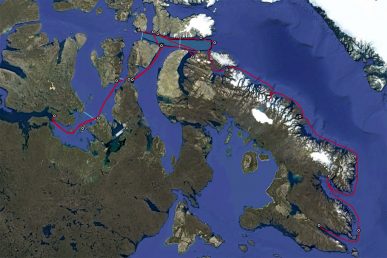UIC students to set off on Arctic adventure through Northwest Passage
*****EXPEDITION UPDATE – Aug. 27*****
On the morning of Aug. 24, the Akedemik Ioffe became grounded in the Canadian Arctic’s western Gulf of Boothia, 80 nautical miles north of Kugaaruk in Canada’s Nunavut territory. All passengers, including the six Northwest Passage Project participants from UIC, were uninjured and remained safe as federal and territorial authorities were contacted to inspect the ship. Coast Guard helicopters were on site, and although evidence of leaks did not appear, the vessel’s damage was deemed enough to cancel the expedition. With the permission of the Canadian Coast Guard, the students were transferred for safety during the morning of Aug. 25 to the Akedemik Ioffe’s sister vessel, the Akedemik Sergey Vavilov, which transported passengers to Kugaaruk.
The UIC students spent the night on the Vavilov at Kugaaruk until a chartered airplane arrived on Aug. 26, which took them to Edmonton. After spending last night at a hotel, they are scheduled to catch connecting flights and arrive in Chicago late this evening.
Throughout this process, UIC liaisons remained in contact with One Ocean Expeditions, the Inner Space Center, and the U.S. Embassy, and reported updates as they became available to the UIC participants’ emergency contacts.
Miquel Gonzalez-Meler, UIC professor of biological sciences and the project’s UIC faculty liaison, reports that the UIC student crew members are “tired, but happy and already asking about attending UIC classes on Tuesday.”
Prior to the ship’s grounding, the expedition team’s short-lived research voyage already provided many sightings of near-threatened and hard-to-spot polar bears and narwhals.
**********************************************************************************************************************************************

The journey into the Northwest Passage will commence in August of 2018 departing from Resolute Bay then traveling south and west to Cambridge Bay via Bellot Strait. The expedition will return to Lancaster Sound and Pond Inlet before traveling down the east side of Baffin Island.
As University of Illinois at Chicago students return to campus in late August for the fall semester, most will be in lecture halls, classrooms and research labs.
But a select group – five undergraduates and one graduate student – will be aboard a polar vessel for three weeks as part of the Northwest Passage Project, a historic, educational excursion across the remote Canadian Arctic.
Led by the Inner Space Center at the University of Rhode Island, the expedition will bring together students from UIC and four other minority-serving institutions with natural and social scientists and a professional film crew for a climate and marine research program funded by the National Science Foundation and the Heising-Simons Foundation.
From Aug. 23 to Sept. 13, the students will learn about polar science and climate change as One Ocean Expeditions’ state-of-the-art research vessel Akademik Ioffe traverses the Northwest Passage. Students will also contribute to Facebook Live broadcasts from sea and work alongside ocean scientists as they conduct Arctic research. The journey includes multiple stops for field research along the way.
“This will be an immersive, one-of-a-kind experience for our students,” said Miquel Gonzalez-Meler, professor of biological sciences and the project’s UIC faculty liaison. “They will not only strengthen their research skills and knowledge, but also help deliver important information to better inform the scientific community and the general public about the Arctic’s transforming environment and the impact the changing Arctic is having on the habitat and its inhabitants.”
The “Slocum Glider,” an autonomous underwater vehicle, will take samples from the eastern waters of Lancaster Sound, a critical point in the Northwest Passage between the Beaufort Sea and Baffin Bay.
Besides water, ice and air sample collections, the project’s research plans include investigating the physics of Arctic Ocean circulation and the chemistry of the melting Arctic ice. Through surveys of Arctic habitats, the project will also contribute to the understanding of the maritime history of the Northwest Passage, the role of the Inuit people in Arctic history, how climate change affects indigenous populations and the waterway’s geopolitics.
“Every part of the project’s mission inspires me and engages me,” said Miriam Hoffmann, a senior in psychology from Rockford, Illinois, who credits her upbringing as a child for fostering a deep appreciation for nature and the environment.
“I grew up with adventurous parents who created a self-sustaining home equipped with solar panels, solar-heated water, electric vehicles, and self-grown produce,” she said. “These experiences have sculpted my mindset and helped me to understand how dire it is to conduct research on the effects of climate change and to educate the public on the topic.”
It is a critical moment, environmentally and politically, to make these measurements in the Northwest Passage, according to Max Berkelhammer, UIC assistant professor of earth and environmental sciences, who is also involved with the project.
“Warming in the Arctic is driving significant changes in Arctic ecosystems and these types of research expeditions provide necessary information to help predict what aspects of the systems are most vulnerable. At the same time, the Arctic is in a particularly sensitive political space with new possibilities for commercial traffic and trade amidst fraught relationships between U.S., Canada and Russia,” he said.
“It is a challenge that the students taking part in the cruise will inherit and they’ll need to be able to address it from a ‘systems’ approach that simultaneously considers the climate, biological, economic and political aspects of the problem.”
The opportunity to take action on environmental issues in a scientific capacity as an undergraduate student appeals to Humair Raziuddin, a junior from Naperville, Illinois.

Humair Raziuddin, a UIC junior pre-med student dual majoring in biological sciences and psychology from Naperville, Illinois.
“I want to be a part of this great journey to help build my scientific research skills and to help inform the public’s understanding of the changes affecting the region,” said Raziuddin, a pre-med student dual majoring in biological sciences and psychology.
The onboard film crew will capture footage for a two-hour documentary of the expedition titled “Frozen Obsession,” which is scheduled to air in 2019.
Other UIC students participating in the expedition include Tony Bellagamba, a doctoral student in earth and environmental sciences; Frances Crable, a senior in biological sciences from Chicago; Theressa Ewa, a sophomore in biochemistry; Stephanie Kadej, a junior in biological sciences from Schaumburg, Illinois. Timothy Grider, a sophomore in communications from La Grange, Illinois, and Kim Nguyen, a senior in biological sciences from Chicago’s Edgewater neighborhood, will assist with media production while based at the Inner Space Center in Narragansett, Rhode Island.
Other partners with the Northwest Passage Project include One Ocean Expeditions; the film company David Clark, Inc., and four other minority-serving institutions: California State University Channel Islands, City College of New York, Florida International University, and Virginia Commonwealth University.

